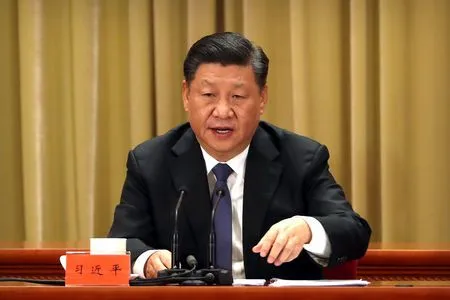Đó là lời của Chủ tịch Tập Cận Bình với phát ngôn viên của quốc hội Iran, trước khi bắt đầu chuyến viếng thăm của Thái tử Saudi Arabia đến Bắc Kinh ngày 21/2.

Chủ tịch Trung Quốc Tập Cận Bình. Ảnh: Reuters
Trung Quốc từ trước đến nay giữ vai trò nhỏ bé trong các vấn đề ngoại giao hay mâu thuẫn tại Trung Đông, bất chấp sự dựa dẫm về nguồn dầu mỏ, mà Iran là quốc gia đứng thứ tư trong số nguồn cung cấp dầu hỏa năm ngoái, nhưng đang cố nâng cao vị thế của mình, đặc biệt là tại khu vực các quốc gia Ả Rập.
Quốc vương Saudi Arabia từng đến thăm Bắc Kinh vào năm 2017, và Thái tử Mohammed bin Salman của nước này sẽ bắt đầu chuyến công du 2 ngày tại Trung Quốc từ ngày 21/2.
Tuy nhiên, Trung Quốc cũng đã phải đi theo một lộ trình khá nguy hiểm khi vẫn có mối quan hệ gắn bó với đối thủ của Saudi Arabia là Iran.
Trong cuộc gặp với Chủ tịch Quốc hội Iran Ali Larijani hôm thứ Tư, ông Tập cho biết hai nước có một tình bạn lâu dài và chia sẻ niềm tin lẫn nhau, theo lời Bộ Ngoại giao Trung Quốc đưa hôm nay.
“Dù tình hình thế giới và khu vực có thay đổi thế nào thì Trung Quốc vẫn quyết phát triển mối quan hệ đối tác chiến lược toàn diện với Iran”, trích lời Chủ tịch Tập.
Trung Quốc và Iran có thể làm sâu sắc hơn niềm tin vào đôi bên và tiếp tục hỗ trợ nhau vì lợi ích cốt lõi và các vấn đề quan trọng, theo lời ông Tập Cận Bình. Trung Quốc chủ trương hợp tác giữa các đảng quốc tế và khu vực để nhanh chóng đưa Trung Đông vào con đường ổn định và phát triển.
Trong chuyến thăm Bắc Kinh, ông Larijani đi cùng Bộ trưởng phụ trách dầu mỏ Bijan Zanganeh và Bộ trưởng Ngoại giao Mohammad Javad Zarif.
China’s desire for close Iran ties unchanged, Xi says ahead of Saudi prince's visit
(Reuters) - China's desire to develop close ties with Iran will remain unchanged, regardless of the international situation, President Xi Jinping told the speaker of Iran's parliament, ahead of Thursday's visit to Beijing by Saudi Arabia's crown prince.
China has traditionally played little role in Middle East conflicts or diplomacy, despite relying on the region for oil, with Iran its fourth largest supplier last year, but has been trying to raise its profile, especially in the Arab world.
Saudi Arabia's King Salman visited Beijing in 2017, and Saudi Crown Prince Mohammed bin Salman arrives on Thursday for a two-day visit.
However, China has had to walk a fine line, as it also has close ties with Saudi Arabia's regional foe, Iran.
Meeting Iranian Parliament Speaker Ali Larijani on Wednesday, Xi said the two countries had a long friendship and shared long-tested mutual trust, according to a Chinese foreign ministry statement issued on Thursday.
"No matter how the international and regional situation changes, China's resolve to develop a comprehensive strategic partnership with Iran will remain unchanged," it paraphrased Xi as saying.
China and Iran should further deepen strategic mutual trust and continue to support each other on core interests and major concerns, Xi added.
China advocates cooperation among international and regional parties to swiftly put the Middle East on the road of stability and development, he said.
"We support Iran in playing a constructive role in maintaining regional peace and stability and are willing to closely communicate and coordinate on regional issues," Xi added.
In Beijing, Larijani has been accompanied by Oil Minister Bijan Zanganeh and Foreign Minister Mohammad Javad Zarif, who met his Chinese counterpart on Tuesday.
Washington's major European allies opposed a decision last year by U.S. President Donald Trump to abandon the Iran nuclear deal that included China and Russia, and lifted international sanctions on Iran, in return for curbs on its nuclear program.


